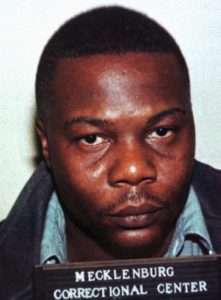Michael Satcher was executed by the State of Virginia for the murder of Anne Elizabeth Borghesani
According to court documents Michael Satcher would attack Anne Elizabeth Borghesani who was riding her bike along a trail. Anne Elizabeth Borghesani would be sexually assaulted and murdered. Earlier the same day Sacher would attack another woman
Michael Satcher would be arrested, convicted and sentenced to death
Michael Satcher would be executed by lethal injection on December 9 1997
Michael Satcher Photos

Michael Satcher Case
Michael Charles Satcher, whose rape and murder of a Washington paralegal on an Arlington bicycle trail became a symbol of sexual violence against women, was executed tonight at the Greensville Correctional Center here.
Satcher, 29, a Southeast Washington furniture mover, was pronounced dead at 9:08 p.m., six minutes after an injection of drugs halted his heart and lungs.
He was executed for the slaying of Anne Elizabeth Borghesani, whom he stalked as she headed to a Metro station on the way to her 23rd birthday party on March 31, 1990. Friends found the body of the recent Tufts University graduate stabbed 21 times and naked from the waist down in an office building stairwell.
The incident horrified residents and mobilized police and users of jogging trails and exercise paths across the Washington area.
Satcher said in a written statement released by one of his attorneys after his death: “To my family I want to say, Thanks for being the best family a person could ever have. I love you all.’
“To my friends on death row,” he added, naming 10 inmates, “I would like to say, See all of you on the other side. My family will be praying for all of you.’ “
Four hours before the execution, Gov. George Allen (R) rejected a final clemency petition by Satcher’s attorneys, who pleaded with the governor to allow new DNA testing on crime scene evidence. They argued that the 1995 testing of Satcher’s blood using new technology produced some results that conflicted with evidence used by the state at trial.
In a 12-paragraph statement, Allen called the claim “utterly inconsequential.” Satcher also was identified by two witnesses who said he sexually assaulted one of them the night Borghesani was killed, Allen wrote, near where her body was found
“There is absolutely nothing in the record of this case that causes me to question the accuracy of the DNA tests introduced at trial,” said Allen, who has commuted two death sentences and permitted 24 executions. “I find no reason to overturn the judgment and sentence rendered by the jury in Satcher’s trial.”
A three-judge federal appeals court ruled in September that neither the DNA claim nor the fact that prosecutors wrongly permitted the surviving victim to identify Satcher in his original 1991 trial in Arlington warranted a retrial, reversing a lower U.S. District Court’s finding.
The U.S. Supreme Court rejected Satcher’s final appeal last week on a 7 to 2 vote.
After Satcher’s trial, the Borghesani family, of Lexington, Mass., spoke out against violence that at the time seemed to be increasing in urban areas. The family compared Borghesani’s slaying to an incident the year before in which a jogger in New York’s Central Park who was left near death by youths who told police they were out “wilding.
“We are feeling overwhelmed by Anne’s death and by the amount of senseless violence in our country,” her parents, Elizabeth and Roger Borghesani, wrote in an editorial. “Something must be done; we must not simply watch it continue to escalate.”
Arthur L. Karp, a deputy commonwealth’s attorney who tried Satcher with Helen F. Fahey — the former Arlington prosecutor who now is U.S. attorney for Eastern Virginia — said that even now, he tries “not to think about” the emotional case.
“If I had the slightest doubt about Satcher’s guilt, I’d be on the same side as the defense attorneys asking that the case be reopened,” said Karp, recalling how many people in the courtroom were in tears as witnesses testified about finding Borghesani’s body.
Tonight, Satcher’s parents, three sisters, wife and two sons spent final tearful hours with the condemned man in the isolation cellblock adjacent to Virginia’s death chamber here, about 60 miles south of Richmond, one of Satcher’s attorneys said.
.
Upon Allen’s decision, they released a statement calling Satcher’s execution a tragedy.
“Our father, son and brother will die tonight without having had a chance to prove his innocence,” said Satcher’s parents, George and Vashti Satcher, custodial workers living in Prince George’s County; Gloria Williams, mother of Satcher’s 7- and 9-year-old sons; and his sisters, all of Southeast Washington. “The governor has taken that away from Michael.”
Satcher’s attorneys, Lee Ann Anderson McCall and John L. Hardiman, added, “The people of the Commonwealth of Virginia should be concerned that prosecutorial zealousness will hide the truth.”
In a statement with a headline that said, “Innocent man, Michael Satcher, to be executed tonight,” they called for legislation to give death row inmates wider access to retest evidence after conviction when new, more accurate DNA technology is available at minimal delay
Henley Gabeau, executive director of the Road Runners Club of America in Alexandria, created in 1989 to combat rising assaults on women, recalled the case as “particularly horrific” and “scary,” remembering how friends last spoke to Borghesani by telephone as Borghesani ironed her party dress.
Michael Satcher, who maintained that he was innocent, was arrested in August 1991 after trying to attack three women on another Arlington trail with a knife wrapped in a shirt. He also faced three life terms and an 11-year sentence for the other March 31 assault.
Michael Satcher’s execution was the eighth in Virginia this year, matching 1996 for the most executions in one year in the state. Another execution is scheduled for Thursday









